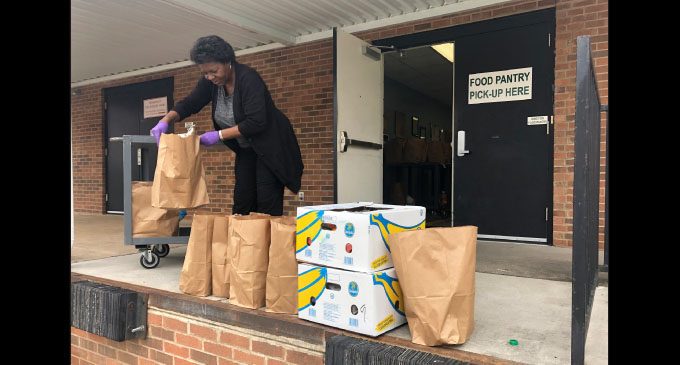Local nonprofits adapting to provide services without senior volunteers
Cynthia Mickle, Crisis Control Ministry’s food pantry manager, puts out prepacked food orders for clients to pick up outside the food pantry.

By Judie Holcomb-Pack
Before the COVID-19 crisis, any time you walked into an art gallery, hospital, community service agency, library, or other organization, you would see older adults working – for free – volunteering their time to support these community organizations. According to the National Community Service, people age 50 and over make up nearly 35% of those who volunteer on a regular basis.
According to The Bureau of Labor Statistics, volunteers are worth on average $24.14 an hour. That can amount to a substantial savings for nonprofits that depend on financial donations to cover the cost of their services.
Barbara Campbell is just one of those volunteers. Campbell and her husband Bob volunteered for over 20 years at Crisis Control Ministry. Now she volunteers at The Solus Christus (“in Christ alone”) Thrift Shop … or at least she did until last week. “This week the thrift shop closed temporarily because of the Coronavirus,” said Barbara. “I look forward to my Fridays at the shop. I will miss the comradery of working with other volunteers, but I especially will miss the people who come into the shop, many who are regulars. Not only do customers enjoy finding treasures, many just need someone to listen to their stories. Most of all, I will miss the opportunity to do something to make my community a better place.”
What are local nonprofits doing now that these senior volunteers are staying home to protect their health?
Samaritan Ministries is one such organization that depends on older adults to help with such things as preparing and serving meals to the hungry and overseeing their homeless shelter during the evening. Sonjia Kurosky, executive director, said they have asked volunteers age 65 and older to not come to the shelter. They are currently passing out lunch meals at the door, but need 10-12 daytime volunteers to help. They need eight volunteers every night to monitor their overnight shelter. These regular volunteers are hard to replace.
Like most other places, they have stepped up their cleaning and are following guidelines from the city and Forsyth County Public Health, such as disinfecting common areas more frequently and practicing social distancing. Overnight volunteers sleep in a separate dorm room away from the shelter residents. They use people who need community service hours, such as offenders with mandated community service, but that still does not fill the need. College students who are now home would be a godsend for Kurosky. For more details or to volunteer, visit www.samaritanforsyth.org.
Margaret Elliott, executive director of Crisis Control Ministry, said their older volunteers are no longer coming in and they have made changes to how they are providing services to protect not only their clients, but also the staff. They have closed their lobby, shortened their hours to 9 a.m. to noon Monday through Friday, and are doing phone rather than in-person interviews. With the recent news that eviction notices will not be served over the next few weeks and water and electricity will not be turned off due to nonpayment, they have seen some decrease in requests for financial assistance. However, she expects these to go up significantly when the crisis is over and the past due bills will need to be paid. Currently, staff instead of volunteers is handling phone interviews and prepacking food orders in the food pantry that are being handed out at the food room door. The pharmacy is still operating with staff only and is dispensing 60-day supplies of medications.
Elliott said this is the first time in the history of the ministry that they have had to cut back on serving clients and it is heartbreaking. She said that staff is currently working full time, but with an expected drop in donations, she is not sure how long this will continue before they may be forced to cut back hours. Donations can be made online at www.crisiscontrol.org.
Senior Services is another agency that depends on volunteers, especially to distribute meals-on-wheels. According to information on their website, they are in touch with Meals on Wheels programs across the nation to determine best practices during these unprecedented times. In an email from Joel McIver, vice president of community engagement, as of March 30, they are suspending daily meal deliveries and will instead transition to delivering a week’s worth of frozen meals to Meals-On-Wheels participants. Their website noted that volunteers will leave the meals for recipients at the door, without making person-to-person contact or entering the home, and will make contact with the meal recipient or someone in the home to ensure they are there and know the meal is outside. This can be done by making eye contact through a window, speaking to the recipient through the door, or calling them to let them know the meal has been left outside. They will also be placing meals in a plastic grocery bag to hang on a doorknob or left on the porch. They are in need of donations of plastic bags so that the meal and other items such as juice, milk or other sides can be put in it. Staff members are also helping to deliver meals to replace older people who are unable to volunteer at this time.
Volunteers who are now staying at home are making phone calls to check on clients and these “tele-chats” help avoid social isolation. Their other services, such as the Help Line, Home Care and Living-at-Home case management programs are continuing to operate with small adjustments and limited face-to-face contact.
For more information and updates, visit www.seniorservicesinc.org.
These are troubling times and it’s understandable that people are anxious and scared. Our nonprofits and agencies are doing their best to continue to provide services without their most valuable resource – their older volunteers. What can we do to help?
Donations, whether financial or food, is most important. Second, volunteer to make calls or send cards to seniors who are staying inside and who are isolated. Shepherd’s Center, Senior Services and Trellis Supportive Care can offer suggestions on how you can help with telephone chats or card connections. Check on your older neighbors who may be alone.
“We are aware of the necessity to do things differently to keep people safe,” said Joel McIver. “However, we refuse to forget about one of the most vulnerable groups in our community – seniors who require our help and support – especially during this most difficult of times.”















